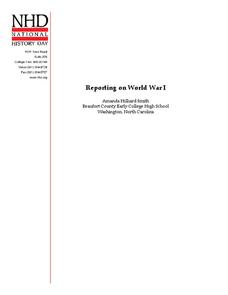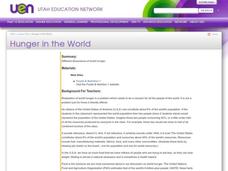Curated OER
Molly Pitcher -- "Out of Many, One"
Students research, brainstorm and analyze the events that lead up to the Revolutionary War. They critique a piece of artwork depicting a scene from the Revolutionary War. Each major battle is plotted on a map to show a visual...
Curated OER
Using Negotiation to Settle Difficulties
Eleventh graders explore, analyze and study how to make decisions and act as responsible members of society. They role-play several scenarios of enactments of individuals making choices for resolving conflict while respecting others.
Curated OER
Worksheet for Analysis of a Letter
Dear Nancy, how do you analyze a letter? Love, Trez. Dear Trez, you use a Letter Analysis Worksheet. Love, Nancy.
This richly detailed worksheet provides multiple questions that lead researchers step-by-step through the process of...
Curated OER
Cartoons in the Classroom: Conserve or Drill
To drill or to conserve? This question is the foundation of the political cartoons up for critical analysis in this well-composed worksheet. Learners will analyze two cartoons guided by background information and excellent questions for...
Curated OER
Cartoons for the Classroom: Charisma vs. Experience
Which is more important for a president: experience or charisma? Scholars consider this as they analyze 2 political cartoons in this analysis handout. Background information gives context through a quote from The Telegraph, and 3 talking...
Curated OER
News Journalism Across the Media: Introduction
Although students are aware of news as information that influences their perceptions of the world, they are often unaware of the various ways to present that information. Encourage them to investigate, discuss, analyze and make valuable...
National Endowment for the Humanities
Revolution '67, Lesson 2: What Happened in July 1967? How Do We Know?
Even in a world in which dozens of participants and curious onlookers record every controversial event, the basic facts of what happened are often in dispute. Revolution '67, Lesson 2 explores 1967 Newark, New Jersey using an examination...
Shmoop
ELA.CCSS.ELA-Literacy.RL.9-10.9
As the saying goes: there are no new stories. Standard 9 for reading literature in the Common Core addresses this fact and requires that students be able to analyze how authors use the themes, stories, and characters of earlier works....
Monarch High School
TP-CASTT Practice
Acronyms can help learners remember facts and analyze poetry. This resource includes graphic organizers for TP-CASTT, SOAPS, SOAPSTone, and DIDLS. Class members can try out one or all of these strategies to assist with that difficult job...
Virginia Department of Education
Composition of Functions
Analyze functions by decomposing complex functions and composing simple functions. Through a detailed lesson plan, pupils learn the vocabulary and notation related to the composition of functions. Practice includes both evaluating and...
Administrative Office of the US Courts
Hazelwood v. Kuhlmeier
Freedom of speech is not always free. Scholars investigate how the First Amendment provides for the right to express opinions. Through the court case Hazelwood v. Kuhlmeier, they analyze free speech using primary documents—and hopefully...
National History Day
Reporting on World War I
Throughout history, newspapers have reported the events of the day as they unfolded. Using primary and secondary sources from World War I, scholars uncover how the American people learned of the events of the War to End All Wars. History...
University of California
Principles vs. Practices
Have you ever wondered what your own World Order would look like? Scholars use primary and secondary documents as well as video clips to investigate and analyze the Cold War. Using the sources, the principles and practices of nations...
PBS
Evaluating Conflicting Evidence: Sultana
What sunk the Sultana? Scholars become investigators to uncover the facts behind the 1865 sinking just after the end of the Civil War. Through group work, videos, and primary documents, they research and analyze why 1,800 men died....
California Academy of Science
The Heat is On: Cause and Effect and Climate
The higher the number of letters in the final word for the National Spelling Bee, the higher the number of people killed by venomous spiders. Obviously, those two facts correlate, but no causation exists. Scholars view data based on...
Jamestown-Yorktown Foundation
What Was Everyday Life like in Colonial Virginia?
What was everyday life like in Colonial Virginia? To find the answer cooperative groups work collaboratively to read an informational handout and complete a graphic organizer. The speaker of the group then shares their new-found...
Roy Rosenzweig Center for History and New Media
Reconstruction
When slavery ended, what did the government do to help African American during Reconstruction? An interesting instructional activity uses primary sources such as newspaper articles to help scholars analyze Reconstruction policies and how...
Curated OER
Hunger in the World
Consider various aspects of world hunger in this writing lesson. After taking a pre-test, middle and high schoolers play a map game, analyze and discuss world statistics, and write a report on an assigned country. The lesson can apply to...
Curated OER
The News Behind the Story
What a fun way to analyze plot, setting, and character. Learners review story elements, read a short fictional story, then turn the events of that story into a headlining news paper article. Not only does this lesson plan engage critical...
Curated OER
Book: Germany
Students, after reading Chapter One in the book, "Germany," analyze and recreate the political boundaries as well as the physical features of the nation of Germany with the assistance of play-doh or salt dough. In groups, they create...
Curated OER
Bats
Use Stellaluna by Janell Canon to discuss bats and other types of animals. Learners identify the differences between bats and birds, list the traits of mammals, create a Bat Facts game, and go on a written scavenger hunt. Fun, clever ideas!
Bantam Books
The Tempest: Think-Aloud Annotation
It can be difficult to refer back to a text when analyzing it, so annotation is a great tool for kids to track what they are reading. A thorough and well-organized activity guides learners through the process of annotating William...
Curated OER
Popular Culture & Diversity
The topic of cultural diversity is explored with the use of pop songs and lyrics. As a way to celebrate Harmony Day, small groups read, reflect, and present their opinions on how the lyrics they analyzed have expressed a statement of...
Curated OER
Exponential Functions
Your algebra learners analyze and interpret the general form and the graph of two functions. The increase of the function due to the multiplicative factor is emphasized.

























